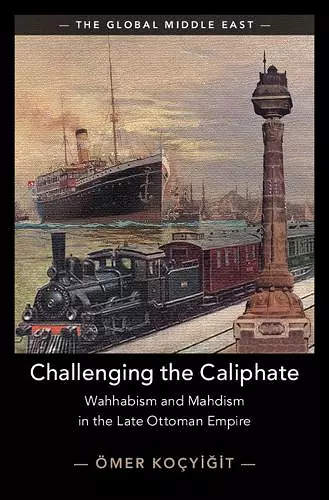Challenging the Caliphate
Wahhabism and Mahdism in the Late Ottoman Empire
Format:Hardback
Publisher:Cambridge University Press
Published:8th Jan '26
Currently unavailable, and unfortunately no date known when it will be back

Examines how steam and print shaped Ottoman centre-periphery relations, exploring the Caliphate, Wahhabism, and Mahdism in a global context.
Examining the role of steam transportation and print culture in shaping Ottoman centre-periphery relations, this study offers fresh insights into the modern Muslim word. Through rich archival research, Ömer Koçyiğit examines the circulation of ideas of the Caliphate, Wahhabism and Mahdism in a global context.How did steam transportation and print culture reshape the Ottoman Empire's centre-periphery relations in the nineteenth century? Challenging the Caliphate offers a fresh perspective on modernization in the Muslim world, exploring how these developments in infrastructure, technology, and communications impacted ideas of the Caliphate, Wahhabism, and Mahdism. Through rich archival research and microhistorical examples, Ömer Koçyiğit demonstrates how new technologies influenced political authority, religious movements, and the spread of ideas. Koçyiğit further explores how the Ottoman Empire dealt with the rise of the Wahhabi movement in the Najd and the Mahdi movement in Sudan. This study situates the Ottoman experience within global transformations, offering a deeper understanding of state, resistance, and connectivity while highlighting how emerging technologies shaped the modern Muslim world.
'Scholarship on 19th century Muslim intellectual history approaches the rise of Wahhabism, Mahdism and increasing reputation of the Ottoman Caliphate as responses to Western imperial hegemony. Challenging the Caliphate corrects this misconception by highlighting Wahhabi and Mahdist movement's dissent with the crucial Tanzimat reforms championed by the Ottoman Caliph, and intra-Muslim polemics in an era of deep transformation propelled by technologies of communication and transformations. Koçyiğit's book dislodges many of the conventional assumptions about the Ottoman policies towards religious dissent and Pan-Islamic solidarity by linking histories of Ottoman Caliphate, Wahhabism and Mahdist thought.' Cemil Aydin, University of North Carolina at Chapel Hill
'This meticulously researched study, based on hitherto neglected original documents, deftly demonstrates that a vibrant Muslim intellectual network emerged long before the advent of the Internet, with new ideas circulating globally among Muslim intellectuals and literati. It further reveals that the Ottoman center—also the seat of the Caliphate, often assumed to have been unaware of or slow to respond to emerging intellectual challenges—closely monitored these developments and produced thoughtful and timely response.' M. Şükrü Hanioğlu, Princeton University
'Based on a very rich collection of hitherto unexplored primary sources in Ottoman and Arabic, the author makes a convincing case that in the age of steam and print, the Ottoman caliphate faced a new and serious challenge to its legitimacy from Islamic revivalist movements.' Erik Jan Zurcher, Leiden University
ISBN: 9781009663496
Dimensions: unknown
Weight: 611g
308 pages